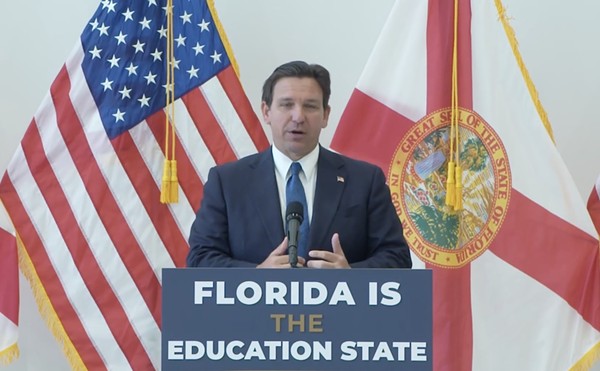Sign, sign, everywhere a sign. Peppering the Lake Highland Preparatory School stretch of Marks Street – 10 feet up off the ground on wooden power poles – blue-and-white propaganda placards beseech drivers to consider Ron Paul for president. Out by the University of Central Florida, homemade stenciled signs clutter a median, suggesting that passersby “Google Ron Paul.” At the busy downtown intersection of Livingston Street and Orange Avenue, a banner wraps around a construction fence declaring a “Ron Paul Revolution,” only the “evol” is reversed and colored red to suggest “love.”
Desperate times apparently call for desperate measures.
“The country is in very serious trouble,” says Nick Egoroff, Orlando Ron Paul 2008 Meetup Group organizer. “Using the word ‘revolution’ is really not out in left field. What we want to accomplish is of course peaceful activism, but, yes, we do revolutionary things. When you go up to a stranger and say, ‘Have you heard about Ron Paul? Would you like a piece of literature?’ That’s kind of revolutionary! Hey, you know, that’s what the country needs and that’s what the country was founded on.”
But the Florida Republican primary is still more than three months away, a fact that places all the Ron Paul guerilla campaigning tactics in legally questionable territory. Political signage is against city and county codes more than 90 days before an election and 10 days after.
Codes aside, there’s the question of how conservatives will react to a seeming lunatic fringe that’s calling for a “revolution”? Conventional logic says not very well. But logic isn’t really at play among Paul supporters. (The website Wonkette.com refers to them as “Paultards.”)
These are viral, grass-roots times for the Paul camp. Just last week they reported raising $5.1 million in the last quarter, which puts them in league with the foundering John McCain campaign. Even though Paul is a running joke in a troubled Republican Party, the 72-year-old’s anti-war, anti-tax, anti-big government stance is finding traction among the conservative/libertarian fringes.
His website, www.ronpaul2008.com, directs potential supporters to Meetup.com to hook up with the like-minded. There are over 250 members in the Orlando Ron Paul Meetup group. It’s a savvy way of getting the word out without having to spend that precious campaign cash. Supporters pay for their own signs – they can cost $3 each with metal stakes, less than $2 without – and those signs officially deny any attachment to any campaign.
“Ron Paul is the spokesman of course for his campaign, but he understands what’s happening in the campaign and in the country right now is really a direct result of total disenfranchisement of a huge group of people,” says Egoroff. “And that’s how we’re going to win; we need to get those people who really traditionally are not voting regularly and need to get them to flock to our side.”
Egoroff himself jumped on the Paul train in May, and when he realized there was only one group in the area – in Apopka – he set his sights on organizing Ron Paul groups in other areas like the University of Central Florida, Oviedo and Altamonte Springs. A former entrepreneur in the satellite dish business, Egoroff, 50, has dropped everything to fight the good fight.
“I basically retired to be on full time at no pay,” he says. “I know it’s crazy. It’s insane, and I would hope that at some point the campaign could support its grass roots with some at least honorarium pay. But life has been good to me. And I feel that at this point it’s important for me to give back to my country. I’ve been successful in business, and now it’s time for real sacrifice.”
That sacrifice includes at least two public sign-waving displays a week, sign-painting parties at members’ homes, administrative meetings and constant monitoring of all things Ron Paul.
As a Paul supporter, you’re never off the clock; you are asked to distribute “slim jims” – small, rectangular one-sheets with campaign positions on them – wherever and whenever possible. Egoroff likes to give them to the wait staff at restaurants, stressing Paul’s proposed tax bill that would make tips non-taxable.
He downplays the significance of the signs at this point, and with good reason. He’s run afoul of the Orange County code enforcement. Egoroff says he warns all Meetup members to obey city and county ordinances, “but I can’t follow them around at night,” he says.
“We are aware of the signs,” says Bob Spivey, Orange County’s manager of code enforcement. “In fact, we looked at some of the Meetup sites and saw that some students at UCF had placed the signs illegally in the right of way.”
Spivey says the matter is under investigation and that code violators could be fined up to $1,000 a day, per sign. The county doesn’t care who paid for them; a political sign is a political sign.
Egoroff views such laws as exactly the kind of thing that keeps the people down.
“The rule is you can basically put the signs out 90 days before the election,” he says. “The problem with that is with the grass-roots campaign, where we don’t have as much money as Mitt Romney to buy ads in the Orlando market right now – he’s buying ads on WDBO, and I saw one on an NFL football game I was watching. We’re getting a good flow of campaign contributions, but realistically this is the only way to build a true grass-roots coalition.”
Ultimately, Paul’s machine may be its own worst enemy. Who ever heard of Republican hippies anyway?
“When you say, ‘Well, we’re gonna be branded the hippies of the Republican Party,’ sure, we have people that have long hair,” Egoroff says. “I know personally an organizer that has a ponytail. We’re totally cool with it. We really don’t want to discriminate against anyone. We’ve got a guy that has like the whole sleeve of tattoos and the earlobe inserts. For me, at 50 years old, it took a little bit of judgment, I’d say. But he’s a great guy. We love him!”
And of course, no reference to hippies would be complete without a mention of drugs, so here it is:
“It’s the coolest thing,” says Egoroff. “If it was a drug, I think you could make millions off of it. There is a high from being involved in the political process, talking to people and saying, ‘Yeah, why don’t we take back the country? Why don’t we take it back from the moneyed interests that are destroying the middle class?’ I think that we’ve started a movement and a network that isn’t going to sort of blend back into the woodwork. We’ve come too far, and even if it were to end today, these people, you don’t just kick the Ron Paul habit in one day or one week.”
[email protected]
















